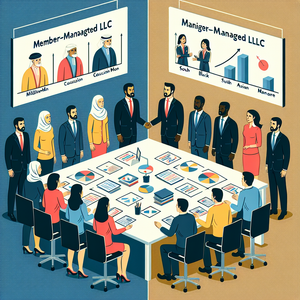The Future of LLC Management: Adapting to Remote Work

The COVID-19 pandemic was a catalyst for a dramatic increase in remote work. According to a Stanford University survey, around 42% of the U.S. labor force was working remotely full-time in 2020, a trend that has continued as businesses recognize the benefits of flexibility. For LLCs, this shift necessitates a reevaluation of management styles, communication practices, and team dynamics to ensure sustained success in a dispersed work environment. In adapting to remote work, LLCs must consider how traditional management structures can be reimagined. The physical office, once the hub of decision-making and collaboration, has been replaced by digital platforms, demanding a fresh approach to how teams interact and operate.
Evolving Roles in LLC Management
In a remote setting, the traditional hierarchical roles within LLC management are evolving into more collaborative structures. For example, the managing member, who traditionally held the reins of decision-making, is now required to share authority and encourage input from team members. This democratic approach not only fosters inclusivity but also empowers employees, leading to enhanced engagement and innovation. Moreover, roles such as compliance officers have expanded beyond mere regulatory oversight to encompass monitoring adherence to remote work policies. They must ensure that all team members understand their responsibilities regarding data privacy and security in a digital landscape. This broader scope of responsibilities necessitates new skills and tools for compliance professionals to effectively manage risks associated with remote operations.
Innovative Management Practices
To thrive in the remote work environment, LLCs must embrace innovative management practices. Regular virtual check-ins are essential for maintaining engagement and a sense of community among team members. These meetings can build rapport, clarify goals, and provide an avenue for feedback, all of which are vital for morale in a remote setting. Additionally, the use of asynchronous communication tools can cater to diverse time zones and work schedules, ensuring that all employees can contribute meaningfully. For instance, project updates shared via a collaborative platform like Slack or Trello allow team members to stay informed without requiring real-time interaction, accommodating different work styles and preferences. Establishing clear performance metrics is another critical practice. In a remote environment, defining success helps motivate team members and instills a sense of accountability. An example of this could be a marketing LLC setting specific targets for social media engagement, allowing the team to track progress collaboratively and adapt strategies as needed.
Tools for Remote Management
The effectiveness of remote LLC management is heavily influenced by the tools employed. Communication platforms like Slack and Microsoft Teams facilitate seamless interaction, enabling quick decision-making and collaboration. These tools break down geographical barriers and help maintain a cohesive team dynamic. Project management software, such as Asana or Monday.com, allows teams to keep tasks organized and ensures that everyone is aware of their responsibilities and deadlines. This visibility is crucial for accountability and helps prevent tasks from falling through the cracks in a remote setting. Video conferencing tools, such as Zoom or Google Meet, have become indispensable in maintaining personal connections among team members. Regular face-to-face interactions, even in a virtual format, foster relationship-building and team bonding, which are essential for cultivating a positive remote work culture.
As LLCs navigate the opportunities and challenges presented by remote work, it is essential to adapt management structures and strategies accordingly. Embracing collaborative approaches, implementing innovative management practices, and leveraging digital tools are vital for maintaining productivity and cohesion in a dispersed environment. By proactively addressing the evolving demands of remote work and recognizing the need for change, LLCs can not only survive but thrive in this new era of business operations. The future of LLC management is not merely about adapting to change; it's about seizing it as an opportunity for growth and innovation, ultimately redefining the way businesses operate in the digital age. In this evolving landscape, a deep understanding of LLC management roles will be crucial. As the nature of work continues to change, so too must the strategies employed by LLCs to ensure they remain competitive and effective in meeting their goals. By fostering a culture of adaptability and innovation, LLCs can emerge stronger and more resilient in the face of future challenges.
Remote Compliance Officer
Tech companies, financial institutions, and consulting firms
Core Responsibilities
Monitor and enforce adherence to remote work policies and regulations, ensuring compliance with data privacy and security standards.
Conduct regular training sessions for employees on compliance protocols and best practices in a remote environment.
Assess risks associated with remote operations and propose mitigation strategies to the management team.
Required Skills
Strong understanding of data protection laws (e.g., GDPR, CCPA) and remote work regulations.
Excellent communication and training skills to effectively convey compliance requirements.
Experience with compliance software and tools for monitoring adherence and reporting.
Virtual Team Manager
LLCs in various sectors, especially marketing, IT, and consulting
Core Responsibilities
Oversee remote teams, ensuring effective collaboration and communication through digital platforms.
Implement performance metrics to track team productivity and engagement levels.
Facilitate regular virtual check-ins and team-building activities to foster a strong remote work culture.
Required Skills
Proven experience in managing remote teams and understanding of asynchronous communication tools.
Strong leadership skills with the ability to motivate and empower team members from a distance.
Familiarity with project management software to streamline task allocation and tracking.
Remote Work Policy Analyst
HR consulting firms, corporate HR departments, and educational institutions
Core Responsibilities
Develop and analyze remote work policies to ensure they align with organizational goals and legal requirements.
Evaluate the effectiveness of current remote work practices and recommend improvements based on employee feedback and performance data.
Collaborate with HR and management to implement changes and communicate new policies to staff.
Required Skills
Strong analytical skills to assess policy impact and employee satisfaction.
Excellent written and verbal communication skills for drafting policies and conducting training.
Familiarity with remote work trends and best practices across different industries.
Remote Project Coordinator
LLCs, startups, and agencies in various industries
Core Responsibilities
Coordinate project timelines and deliverables for remote teams, ensuring alignment with stakeholder expectations.
Utilize project management tools (e.g., Asana, Trello) to track progress and communicate updates to team members.
Organize virtual meetings and prepare agendas to facilitate discussions and decision-making processes.
Required Skills
Strong organizational skills with the ability to manage multiple projects simultaneously.
Excellent interpersonal skills to effectively collaborate with diverse teams in a virtual setting.
Proficiency in project management software and tools for scheduling and tracking tasks.
Digital Communications Specialist
Corporations, nonprofit organizations, and digital marketing agencies
Core Responsibilities
Develop and execute digital communication strategies to engage remote employees and foster a cohesive company culture.
Create content for internal newsletters, social media, and company announcements to keep teams informed and connected.
Analyze communication metrics to assess engagement levels and improve future communication efforts.
Required Skills
Excellent writing and editing skills with a keen eye for detail.
Experience with digital marketing tools and platforms (e.g., Mailchimp, Hootsuite).
Strong understanding of employee engagement techniques in a remote work environment.


